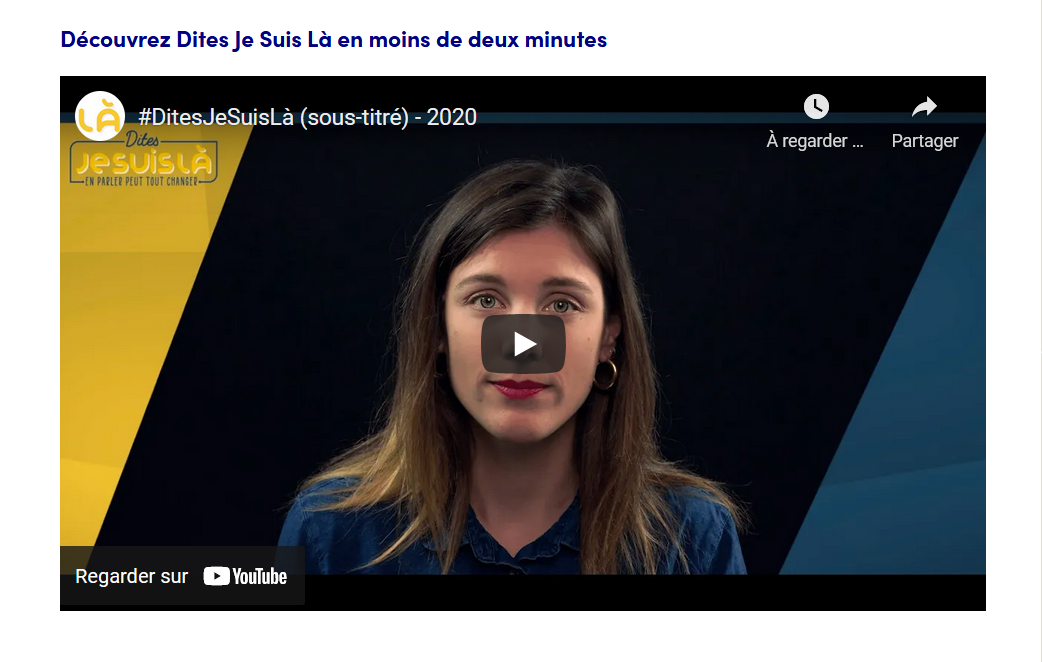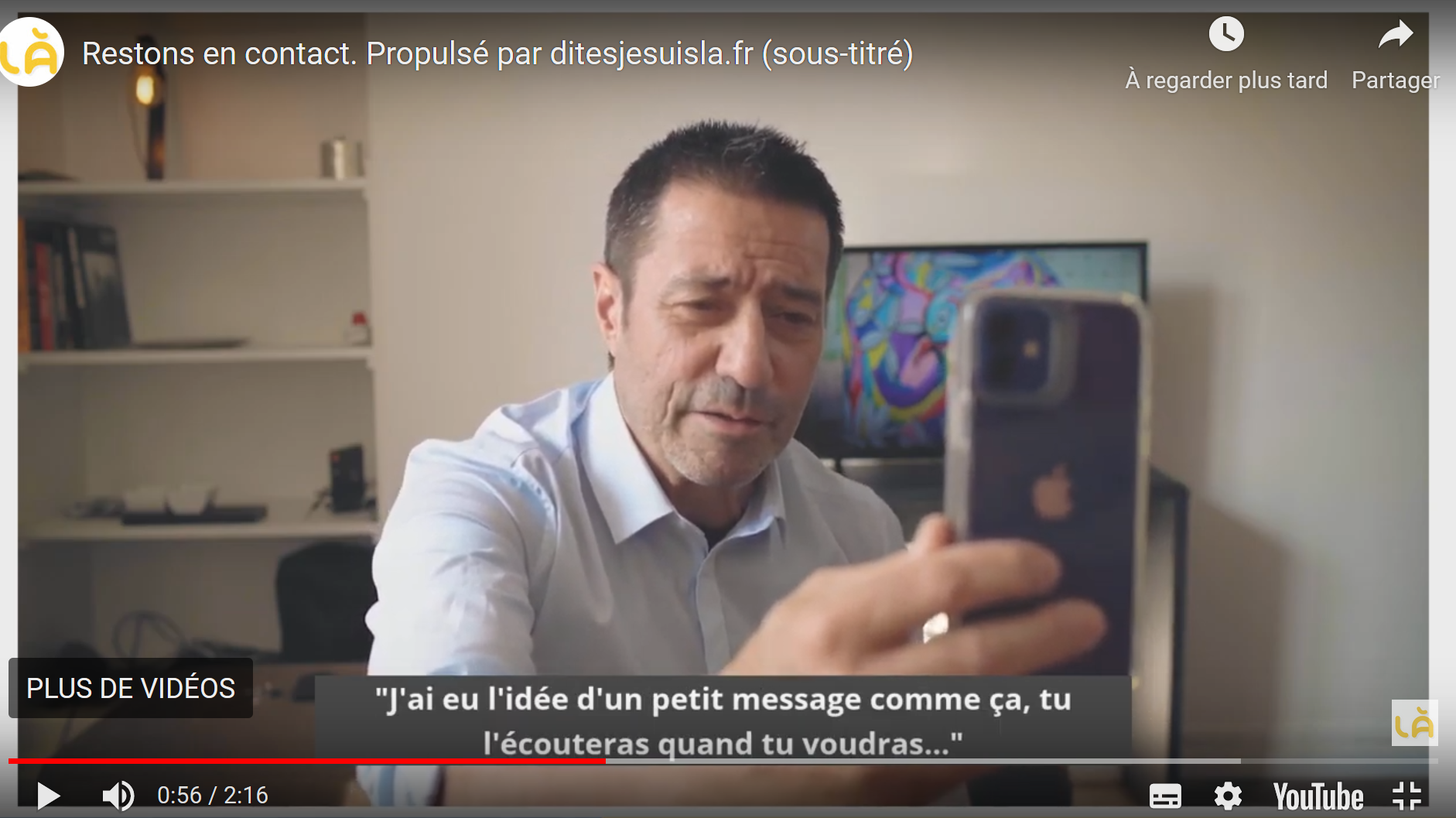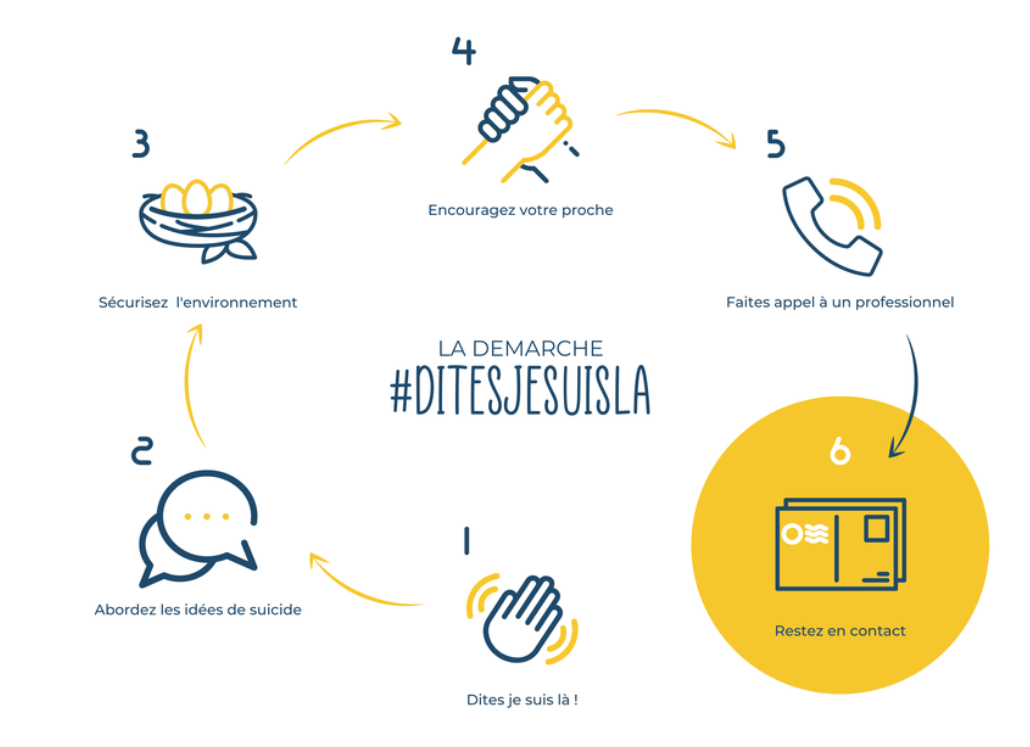Dites Je Suis Là: preventing suicide with a QR code card
A project which aims to prevent suicide by strengthening the links between the person in a suicidal crisis and those around them.
"Are you OK?"
The association Dites Je Suis Là was born thanks to the impulse of Yann Massart, a nurse with whom I work on a daily basis. Yann wanted to adapt in France the Australian initiative R U OK1 ("Are you ok?") which aims to prevent suicide by strengthening the links between the person in a suicidal crisis and those around them. Their credo: "A conversation could change a life".
Made in cooperation with our partners from esanum.fr
In Australia, R U OK has become a vast communication strategy, widely relayed by the media. The aim is to give everyone key concepts and, above all, the confidence to intervene with a loved one in difficulty. When to worry? How to spot when someone is in trouble? How to approach them? What to say, what not to say?
The observation is similar in France: 90% of 15-25 year olds say they are ready to help a friend in distress, but do not know what to do. So Yann started by translating the R U OK website and adapting their message to the French context. We started humbly, with a simple web page with this message: "Dites Je Suis Là" (Say I am here).
Encouraged by the recognition of our peers in the field of suicide prevention in France, we created the association, which was structured around a board of directors, an editorial committee and a scientific college composed of experts in suicidology.
Suicide, talking about it differently
Dites Je Suis Là is not a listening platform. Our goal is not to replace listening and care centres. What we want to do is to lift the taboo around suicide in order to encourage the general public to access care structures when necessary.
The national suicide prevention strategy includes a section dedicated to the creation of a network of "Sentinels"2, citizens capable of spotting a risk of suicidal crisis. These people - who often have a social role, work in communities, etc. - will be trained. Dites Je Suis Là is still moving upstream and wants to reach the entire population.
The Sentinels are the equivalent of psychological first-aiders. We want to raise awareness among the general public, as has been done, for example, with communication campaigns on the detection of strokes or the use of defibrillators. This is within everyone's reach as long as they have the right information and are in the right frame of mind.
Prevention information on mental health and suicide has a hard time reaching its target. For us, all means are good, especially the most innovative ones: social networks, influencers, applications. Let's talk about suicide where we are not expected, and let's talk about it differently.

Video capture and link to: "Talking about it can change everything” (only available in French). Advice for loved ones from Dr. Pauline Boudin, psychiatrist.
The resources are there: everyone wants to work on suicide prevention. For example, the French start-up Argo. It designs innovative cards that can be personalised using a simple QR code technology to transmit messages. We immediately saw the interest, because it has been proven that maintaining contact with a loved one in a suicidal crisis greatly reduces the risk of committing suicide. But a person in crisis does not always have the energy to call a relative, who may not be available.
Cards
To my knowledge, this is the first time that such cards have been used in suicide prevention. They use progressive web app technology, which allows you to instantly view content, such as a video, without having a dedicated application. No app means much smoother access, regardless of the smartphone's operating system (iOS, Android) and even if the user's smartphone has no memory left.
The idea is that a loved one records a comforting video message on a card - the size of a credit card - and gives it to the suicidal person. The suicidal person simply flashes the card with their smartphone to see the message, at the most convenient time for them. It is very easy to use. The message, intended for this specific use, can be accessed immediately and indefinitely.
The other advantage is that this card is a "physical" object and not a virtual one. The vulnerable person always has it with them, in their wallet for example. It is a reassuring object that reminds us that someone cares about us. It can be given personally, after a conversation, but also sent by post to people who are geographically distant.

Video capture and link to "How does it work? The two-minute demo" (only available in French)
For this project, we launched a crowdfunding campaign and reached our first goal in just four days. We will be able to produce more than 500 QR code cards. By participating in this campaign, everyone can receive cards (depending on the amount of the participation) or choose to let us make them available in strategic places such as university health centres or family planning centres for example.
We hope to defend this project during the Psychodon3 "Pitch Live", to be part of the selection that will be at the Olympics on June 12th. About twenty mental health projects are in the running. After this Ulule campaign, it will be possible to order these cards via our website.
Two interests for physicians
On the Dites Je Suis Là website, we gather clear and scientifically validated information. It is a resource for the health professional, for example a general practitioner whose patient is worried about a relative. The physician's advice is obviously valuable, but once back home the patient has access to a reference site, where he or she will find the steps that will guide them in the process of getting help (see diagram below).

As for the QR code cards, physicians could have a few to distribute to their patients. Of course, they do not replace specialised follow-ups for the suicidal person or the physical presence of their loved ones. In this last step - "Stay in touch" - physicians can propose these cards as a very concrete response to encourage the loved one to maintain a sincere and warm link with the suffering person.
Text: Gabrièle Mugnier (Head of Psychiatric Emergency Department and Liaison Team (French acronym: EPAUL) at the Hospital Centre of Le Mans, France).
Translation from French: esanum
References:
1. R U OK was created in 2009 by Gavin Larkin. His father had taken his own life 25 years earlier. Gavin Larkin died of cancer in 2011.
2. On this subject, we suggest you read a description of the Sentinel training project(in French), produced by the Groupement d'études et de prévention du suicide (GEPS, Group for the Study and Prevention of Suicide).
3. The Psychodon weekend "United against mental illness" will be held from 11 to 13 June 2021.